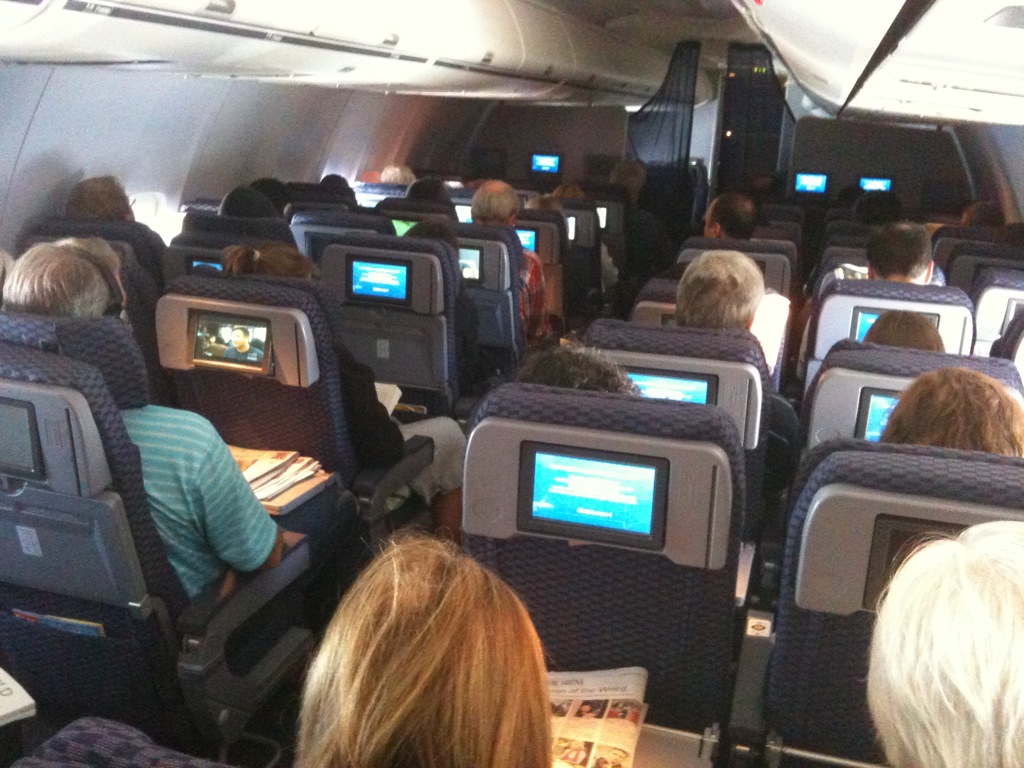

My very first blog post was about my experience with Internet and phone service on planes, and its early disappearance. Now inflight Internet service is reappearing, at least in US domestic routes. The point I was making there was that airlines are experts at pricing airline tickets, maximizing yield. However, they couldn’t figure out how to price and market telephone and Internet service inflight. Well, it seems like not much has changed, at least on some airlines.
I travel quite a bit, mostly on Continental (now in the process of merging with United) – which I mostly enjoy. This morning I boarded an early morning coast-to-coast Continental flight of over 5 hours (and I was not upgraded). Each seat, even in economy, had a nice-looking entertainment system with over 90 channels of DirecTV satellite TV as well as several movie channels and more. The passenger sitting next to me commented upon arriving at his seat and seeing the system: “now that’s the way to fly!” Little did he know…
Continue reading Inflight pricing: some airlines don’t get it →
 Last week – what most predicted – has finally happened: Android passed Apple iPhone in global units sold. This was no surprise. Google’s Android has a much more effective distribution mechanism than Apple’s iPhone. Apple’s iPhone is made by one manufacturer, Apple, and in the US, is only distributed by one service provider – AT&T. On the other hand, Google’s mobile operating system, Android, runs on many hardware manufacturers’ devices (HTC, Motorola, Samsung and others) and is distributed by many service providers in almost every region. It was just a matter of time until this strategy paid off for Google.
Last week – what most predicted – has finally happened: Android passed Apple iPhone in global units sold. This was no surprise. Google’s Android has a much more effective distribution mechanism than Apple’s iPhone. Apple’s iPhone is made by one manufacturer, Apple, and in the US, is only distributed by one service provider – AT&T. On the other hand, Google’s mobile operating system, Android, runs on many hardware manufacturers’ devices (HTC, Motorola, Samsung and others) and is distributed by many service providers in almost every region. It was just a matter of time until this strategy paid off for Google.
This raises the question: Will Android do to the iPhone what Windows has done to the Macintosh? More specifically, will Android make iPhone a niche solution? Even though the Mac was the first successful computer to have a graphical user interface and a mouse, Microsoft came from behind with Windows and reduced the Apple Macintosh computer to about 4% market share. It did so by making Windows practically ubiquitous – distributed by practically all other PC manufacturers.
Is Google Android going to do the same to the iPhone? All early indications are that it will.
So what might Apple do in order to prevent history from repeating itself?
Continue reading How Apple Can Still Beat Android →
Tal Givoly on Internet, gadgets, health, communications, entrepreneurship, innovation, consumer electronics and more!


 Last week – what most predicted – has finally happened:
Last week – what most predicted – has finally happened: